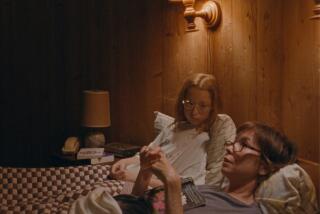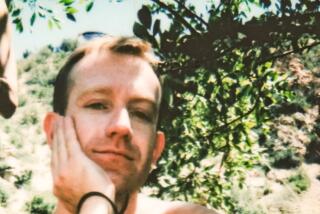‘The Financial Lives of the Poets: A Novel’ by Jess Walter
The Financial Lives
of the Poets
A Novel
Jess Walter
Harper: 290 pp., $25.99
Vision suffers in Jess Walter’s fiction: Eyeballs are shot out by BB guns or covered by patches, retinas detach, debris floats in the vitreous. Even characters lucky enough to keep their eyesight have trouble with perception.
For Matt Prior, the recently unemployed hero of Walter’s darkly funny, surprisingly tender, verse-sprinkled fifth novel, “The Financial Lives of the Poets,” the occlusion is of a more moral sort. The cause? Raw fear, exacerbated by sleeplessness, both normal responses for a 46-year-old man with no income, no real job prospects, a strained marriage, two little boys, a senile live-in dad and seven days to either scrape up $30,000 for a balloon mortgage payment or lose his house.
None of this explains what Matt is doing getting high with a couple of tattooed thug-lite types named Skeet and Jamie during a wee-hours milk run to 7-Eleven. They nickname him Slippers after his footgear, although, he explains, “they’re not technically ‘slippers,’ but a casual loafer I got at the Nordstrom Rack with a gift certificate when I returned a cardigan that made me look like my grandfather.”
Nor does it explain -- shades of “Weeds” -- why selling pot to middle-aged, middle-class stoners suddenly strikes Matt as a way out of his troubles. Matt tries to be a good dad, a good husband, a good son. But in his frantic, sleep-deprived state, his judgment isn’t what it was.
Like the drugs, the looming foreclosure is something Matt doesn’t mention to his wife, Lisa, fearing she will leave him if he does. It’s only been two years, after all, since he cashed in a large stack of marital chits by quitting his business reporting job to found poetfolio.com, a poetry-and-investment website that he hoped would become “a literary discussion of the thing that most of us spent so many days thinking about: our money.” Instead, the site devoured the couple’s savings before Matt scrambled back to his old newspaper, which laid him off just as the rest of the economy tumbled into the abyss.
The economy notwithstanding, Matt and Lisa have brought their problems on themselves. They reached too high, too recklessly. But they also counted on a circumstance that is no longer operative: the simple certainty that a skilled professional with long experience has sufficient value in the workforce to earn a living.
Walter is a former newspaper reporter, and Matt’s mocking assessment of the industry’s dysfunction is witheringly dead-on. But the delusions and outright lies undergirding the pre-crash economy are the author’s larger target. He is worried about the country -- worried that we won’t break the bad habits that have gotten us into our current mess: “like some idiot junkie who / kicks smack by going on crack / kicks crack by going on meth / kicks meth by going on smack -- / jonesing for the next thing, because / relapse is what we mean / when we say recovery.”
Of Walter’s previous novels, three are crime fiction, including “Citizen Vince,” a mob story that’s also a profound meditation on civics. The fourth, “The Zero,” set in the aftermath of Sept. 11, is rife with violence that’s more repugnant for being sanctioned by law. In none of these books does Walter let people off the hook for behavior that’s beneath them. Neither does he do so here.
“What kind of man was I?” Matt’s father asks, and it’s the question at the heart of Walter’s work. He has an abiding faith in the ability of human beings to be decent if they make the effort, but this sometimes means squaring debts and starting over, which can require uncommon bravery.
Walter makes this point, subtly and touchingly, in a scene set in one of Matt’s favorite hangouts. The owner is a character we’ve met in a previous Walter book, a guy who long ago had to face the consequences of his actions -- had to pay up -- before he could reach for the simple, honest life he wanted. He understands, as Matt does not, that the easy way out is harder than it looks.
“The Financial Lives of the Poets” is filled with the bumbling sweetness and botched dreams of men: Matt, his dad, his sons, even his ridiculous young weed-merchant colleagues. But what kind of men are they? What will they become? Will they be tough enough to make the necessary sacrifices, to break the habits that could destroy them? As they go, so goes the country. It’s a dangerous business.
Collins-Hughes is a writer and editor in New York.
More to Read
The biggest entertainment stories
Get our big stories about Hollywood, film, television, music, arts, culture and more right in your inbox as soon as they publish.
You may occasionally receive promotional content from the Los Angeles Times.










